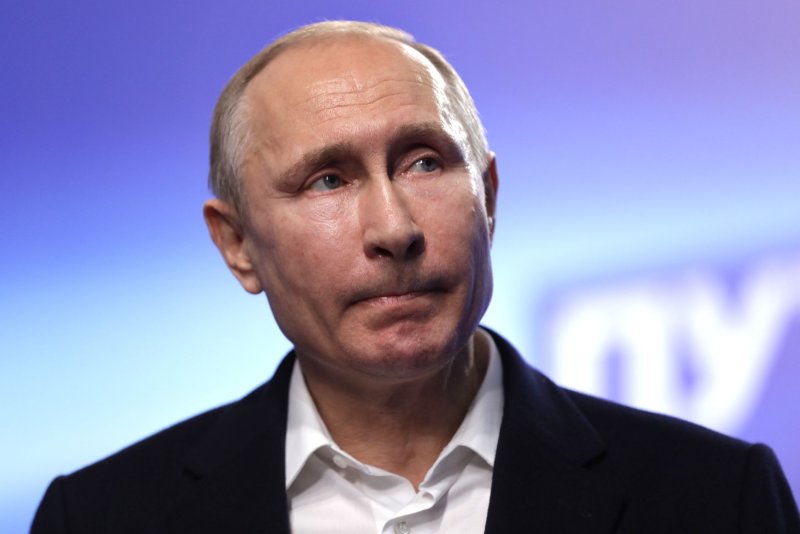With almost total supremacy over the western skies of Syria, little can take place on the ground without Moscow's knowledge and potential intervention. Meanwhile, Russian President Vladimir Putin in injected into the peace process. Photo by Yuri Gripas/UPI. |
License Photo
TUNIS, Tunisia, March 30 (UPI) -- With the rebels' exodus from Eastern Ghouta continuing and the Kurdish People's Protection Units' apparent rout in Afrin, a new chapter appears to be opening in Syria's seven-year war. Pushed to the sidelines are the armed rebels who once opposed the regime and the jihadists who usurped many of their causes.
In their place is a landscape dominated by competing international powers and conflicting national agendas with, for many, Russia the one constant with a rapidly changing theater.
In northern Syria, Turkey is fighting it out with the Kurds. Ankara is seemingly determined to carve out a buffer zone between it and the People's Protection Units' strongholds in Syria.
To the west, is sprawling Idlib, a stronghold of al-Qaida-linked Hayat Tahrir al-Sham and dumping ground for the detritus of rebel battles against the regime and its allies.
Within Damascus's Presidential Palace, Syrian President Bashar al-Assad eyes a largely hostile panorama, resistant to him and his Alawite cohort. Projecting his power across the country alongside his regular forces are the regime's unruly loyalist militias, many of which have been reluctant to surrender often well-paid posts for life in the country's regular forces.
Fighting alongside Damascus's forces are Hezbollah and its Tehran-sponsored proxies, whose allegiance is unclear and whose interest lies possibly toward the Golan and the Syrian border with Israel.
To the east, on the fertile and oil-rich lands beyond the Euphrates River Valley, stand the forces of the United States and its Kurdish allies, trapped within their self-imposed "operational pause" as they await the return of experienced Kurdish fighters from battles against the Turks while the regime and its allies eye the lucrative land beneath their feet.
The United States has little option but to watch and wait, hopeful for the opportunity to trade position and territory for a place at the victors' table.
Throughout Syria's chaos, from the evacuation of Eastern Ghouta to the Turkish advance in Afrin, to the rolling Astana peace process, Russia's hand is tangible.
With almost total supremacy over the western skies of Syria, little can take place on the ground without Moscow's knowledge and potential intervention. In Eastern Ghouta, Russian jets are believed to have taken part in raids that reduced the once prosperous suburb to a state of "hell on earth," as U.N. Secretary-General Antonio Guterres termed it.
The Turkish advance in Afrin would not have been possible without Moscow's initial sanction. Ankara's continued march on Kurdish positions along the frontier hinges on Russia's, albeit tacit, blessing.
It is unclear how much influence Russia can exert on day-to-day tactical moves of the Turks and their allies but "there is speculation that Russia and Turkey have a broad-based understanding about how deep into Syria the Turkish military can push," Aaron Stein, resident senior fellow at the Atlantic Council, said via e-mail.
Far removed from the battlefields of Syria are the endless rounds of Russia's Astana peace process, with Russian President Vladimir Putin the trusted interlocutor for actors as diverse as Saudi Arabia, Iran and Turkey.
This article originally appeared at The Arab Weekly.















